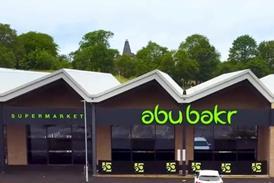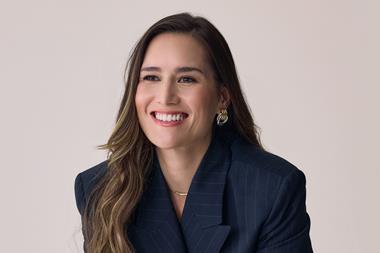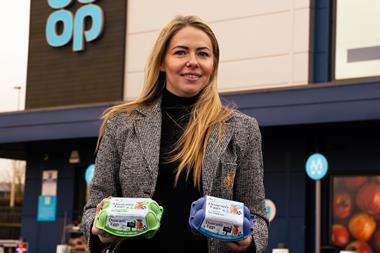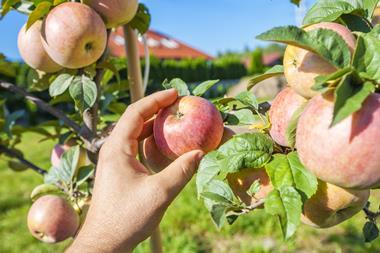The first signs of a comeback were hinted at with last week’s Kantar figures. But amid all the arguments over who won Christmas, The Co-operative Group’s modest but welcome return to like-for-like growth across the combined business - for the first time since May 2009 - were drowned out.
This week, as new CEO Steve Murrells confirmed a 0.3% increase in food sales for the last 13 weeks of 2012 and a 2.2% increase for the three weeks to 5 January, it’s time to assess the extent of the turnaround.
In the grand scheme of things - set against Tesco’s return to form, and the continuing strength of Waitrose and the discounters in the same period - it’s a small rise.
But it marks a turning point for The Co-op which, other than a blip last Christmas, has been reporting falling like-for-like sales for some time. With the uptick sustained into the new year the question is: can the momentum be built on?
In an exclusive interview with The Grocer - his first since taking on the role in July - Steve Murrells admits that although encouraged by the society’s improved performance, there is still an awful lot of work to do to get customers back shopping in Co-op stores again.
“Yes, I am pleased, but as everyone would probably expect us to say, one swallow doesn’t make a summer,” he says. “We are pleased with Christmas, but in fact we are probably more pleased by the changes over the past six to seven months. We’ve just enjoyed our first positive market share growth in 18 months. And if you take the second half and the last quarter, and then on top of that Christmas, we’re starting to show we’re getting back to basics and becoming good shopkeepers again.”
Christmas gave the Co-op a chance to show shoppers how it is changing and what they can expect from the Co-op going forwards, Murrells explains.
Steve Murrells
Murrells came on board at The Co-operative Group in July last year, replacing Tim Hurrell who retired.
Although he came from a supplier - as CEO of Danish meat giant Tulip - Murrells has spent most of his career on the retailing side of the grocery industry.
He was buying department head at Sainsbury’s before joining Tesco in 1992. He held a number of dairy and meat positions before becoming a category manager, including for fresh produce - a role in which he is credited with increasing Tesco’s British-sourced fruit and veg. He then took the helm at Tesco’s c-store chain One Stop, before heading its garden centre business Dobbies.
It’s worked. The society reported a 53% increase in own-label party food a 38% increase in chilled ethnic party food led by three-for-two offers on Indian, Oriental, and Tex Mex selections a 32% increase in chilled seasonal desserts such as profiteroles, tiramisu and limoncello and gift cards up 20% on the back of an iTunes voucher promotion.
The Co-op’s in-store offer was backed by a new direction for its TV advertising, replacing the six-year-old ‘Good with Food’ strapline - which Murrells acknowledges was no longer even true - with ‘Here For You for Life’, as the focus switched to the quality and availability of Co-op products in moments of family need during the festive season.
“What we need to do, and are working to do, is build back real credibility in food to our customers, and give them a real reason to come and shop in our stores again,” Murrells explains. “If you get Christmas right, it’s a good chance to persuade them to stay with you for the rest of the year. That’s why Christmas was so important.”
New team
Since July, Murrells has been building up a new management team, including high-profile scalps from the multiples (see p64). Together, they’ve been working on a new Future Food Strategy. Murrells isn’t ready to unveil the strategy yet - it is expected within a couple of months - but it follows on the work the society has been trialling in stores across the country, adapting its offer to suit the local demographics.
“I’m very pleased with the work so far,” he says. “If you look at our fresh format trial stores, over Christmas their like-for-likes were in double digits. These fresh stores run at about 60% fresh, when in the past it would have been more like 30%. It has gone done extremely well in the surrounding neighbourhoods.”
The strategy is also about getting the food business back to basics. “We’ve been making sure availability is better, making sure our promotions are more targeted and making sure consumers are getting better value for money,” he adds. “In truth, the business has not been firing on all cylinders for a while now and we are starting to address those issues.”
It’s also about getting suppliers on board, too. Two months ago, Ian Martin, the Co-op’s new head of commercial trading for BWS, tobacco and frozen food - who joined from Asda in September - told suppliers at a conference that the society “should be doing better” and was changing the way it dealt with suppliers to improve performance.
The food business will move across the road into the Co-op Group’s new One Angel Square HQ in Manchester in April and Murrells recently invited the top 40 suppliers for a tour. “We took them round the offices last week to show them our ambitions and also to talk about what it is like to deal with the Co-op - and they were absolutely blown away by it.”
‘A real barometer’
There’s also clearly a new way of thinking since Murrells has joined. Before his arrival, for example, the society said it took no notice of the Kantar Worldpanel data because it was more geared towards larger supermarkets than its core top-up shopping. Now, Murrells describes it as “a real barometer that anchors us to the competition and is very much used within the business”.
The society also used to say that, being a community retailer in every postcode of the UK, it was especially prone to bad weather. Murrells does not see it this way.
“In a perfect world, I’d lift the business up and put it in Dubai. But I believe if you listen to your customers, understand their needs and provide products for their different missions, you can reduce the effects of bad weather in the same way bigger box shops can.”
Peter Marks once said The Co-operative Movement didn’t co-operate, and wasn’t prepared to move. Murrells is moving the needle, and he senses greater engagement too. But he’s not complacent.
“We’re going in the right direction, but the other retailers aren’t waiting for us to catch up,” he concludes. “We’ve got to get customers back into our shops. We’ve got to put our stores at the focus of our thinking, and hope the numbers continue to move in the right direction.”



















No comments yet